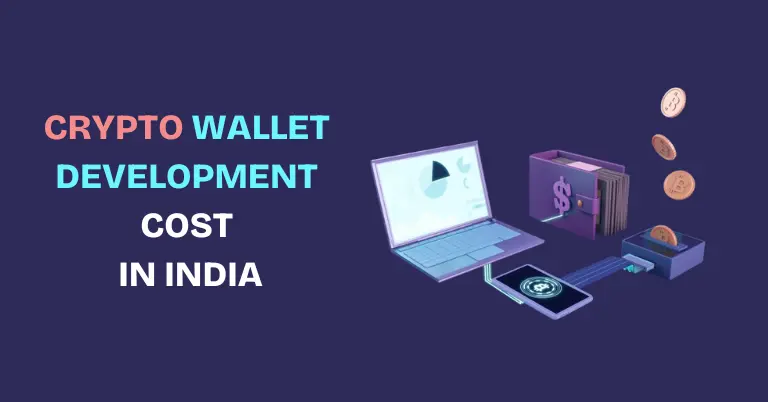India has seen a significant surge in cryptocurrency adoption, with millions of users actively trading, investing, and storing digital assets. As the Web3 ecosystem grows, so does the demand for secure, user-friendly crypto wallet apps. Whether you’re a startup or an enterprise, understanding the crypto wallet development cost in India is crucial to planning your tech investment effectively.
What is a Crypto Wallet and Why Do You Need One?
A crypto wallet is a digital wallet that allows users to store, send, receive, and manage cryptocurrencies securely. It interacts with blockchain networks and stores private/public keys—essentially acting as a user’s gateway to crypto assets.
Types of Crypto Wallets Available in the market:
- Hot Wallets: Always connected to the internet (e.g., mobile apps, browser extensions).
- Cold Wallets: Offline hardware wallets offering stronger security.
- Custodial Wallets: Managed by a third party (common in exchanges).
- Non-Custodial Wallets: Users hold their private keys—greater control and privacy.
Investing in your own crypto wallet allows businesses to offer branded digital asset solutions, enable peer-to-peer payments, or build DeFi/NFT platforms.
Key Features That Affect Crypto Wallet Development Cost in India
A feature-rich crypto wallet make sure of a better user experience, security, and engagement. Below are the most in-demand features that impact the Crypto wallet development cost in India:
- Multi-Currency Support (BTC, ETH, MATIC, etc.)
- Biometric & 2FA Authentication
- In-app Crypto Swap & Exchange
- Transaction History & Real-Time Price Feeds
- QR Code Payment Integration
- Seed Phrase Backup & Wallet Recovery
- Push Notifications
- Custom UI/UX with Brand Identity
The more features you integrate, the higher the development timeline and cost.
Major Factors That Determine Crypto Wallet Development Cost in India
Several factors affect the final cost for crypto wallet development:
| Factor | Impact on Cost |
|---|---|
| Type of Wallet | Custodial wallets are cheaper than decentralized ones |
| Number of Supported Coins | More coins = more blockchain APIs to integrate |
| Security Features | End-to-end encryption, 2FA, wallet backup, etc. |
| Platform | Android, iOS, Web, or Cross-Platform |
| UI/UX Design Complexity | Custom vs. template-based designs |
| Developer Location & Experience | Indian developers are cost-efficient but skilled |
| Backend & Server Requirements | Wallets with exchange or analytics need strong infra |
Crypto Wallet Development Cost in India: Full Breakdown (2025)
Here’s a rough estimation based on current market standards:
| Development Component | Estimated Cost (INR) |
|---|---|
| UI/UX Design | ₹30,000 – ₹80,000 |
| Frontend Development | ₹60,000 – ₹1,20,000 |
| Backend & API Integration | ₹80,000 – ₹2,00,000 |
| Blockchain Node Setup | ₹1,00,000 – ₹2,50,000 |
| Security Layer Implementation | ₹50,000 – ₹1,00,000 |
| Testing & QA | ₹30,000 – ₹60,000 |
| Deployment & Maintenance | ₹20,000 – ₹50,000 |
| Total | ₹4L – ₹8L+ |
Note: These are average industry costs for basic to mid-level wallet apps. Enterprise-grade wallets or DeFi integration will cost more.
Read our latest Blog
Read
Best Crypto Wallet Developers in India
India has become a hub for blockchain development services, offering both agencies and freelance developers with deep crypto expertise.
Top Development Models:
- Freelancers (₹3L–₹5L range) – Ideal for MVPs or simple wallet apps.
- Agencies (₹6L–₹15L+) – Recommended for robust, scalable, and secure wallets.
- In-house Team – Only viable for long-term crypto projects.
Always check for Web3 experience, security certifications, and recent project portfolios before hiring.
Tips to Reduce Crypto Wallet App Development Costs
Want to launch faster and cheaper? Here are proven ways to save:
- Start with MVP: Focus on core wallet features first.
- Use White-label Wallets: Customize pre-built wallet templates.
- Opt for Cross-Platform Tech: Flutter/React Native saves dev time.
- Limit Coin Support Initially: Start with BTC/ETH, then scale.
- Outsource to Indian Blockchain Firms: High quality at 50–60% lower cost.
Challenges in Crypto Wallet Development
While India is ripe for Web3 innovation, there are unique challenges you must prepare for:
- Regulatory Uncertainty: Crypto is not banned but lacks clear legal framework.
- Security Risks: From phishing to wallet hacks—security must be top-tier.
- Blockchain Volatility: You’ll need frequent updates due to changing APIs.
- Banking & KYC Integration: Critical for fiat on-ramps and legal compliance.
Always ensure compliance, encryption, and regular updates for wallet apps.
How Long Does It Take to Build a Crypto Wallet App in India?
The timeline varies depending on complexity:
| Project Scope | Estimated Duration |
|---|---|
| Basic Wallet MVP | 4–6 weeks |
| Full-featured Wallet | 8–12 weeks |
| Wallet with Exchange | 12–16 weeks |
| DeFi/NFT Integration | 16–20+ weeks |
Pro tip: Get a project scope doc before finalizing the timeline with any agency or freelancer.
Conclusion: Is Building a Crypto Wallet in India Worth It?
Absolutely! India’s tech talent, combined with growing crypto adoption, makes it one of the best places to develop your own crypto wallet app. Whether you’re launching a startup, creating a DeFi product, or expanding your Web3 offering, a well-built wallet is a smart investment.
With estimated Crypto wallet development costs ₹4 to ₹8 lakhs, Indian blockchain teams offer unbeatable value without compromising on quality or security.
Frequently Asked Questions (FAQs)
Q1. How much does it cost to develop a crypto wallet in India?
A basic crypto wallet costs between ₹4 to ₹8 lakhs, depending on features, platform, and development team.
Q2. Can I launch a white-label crypto wallet?
Yes, white-label wallets are pre-built templates that can be customized to reduce time and cost.
Q3. Is it legal to build a crypto wallet app in India?
Crypto is not banned in India, and wallet development is legal—but ensure you comply with evolving regulations.
Q4. Which tech stack is best for crypto wallet development?
React Native, Flutter (for mobile); Node.js, Python (for backend); Solidity & Web3.js (for blockchain integrations).
